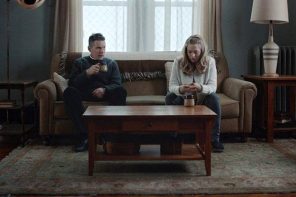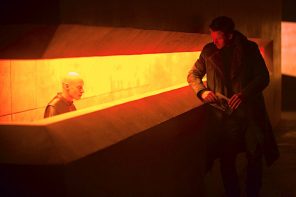I never thought I’d write something like this, but My Scientology Movie actually had me rooting for the Scientologists.
My Scientology Movie is the latest from Louis Theroux, who is perhaps best known for his BBC documentaries about fringe groups like black nationalists and ultra-Zionists. Theroux’s work is ostensibly about investigating and perhaps humanizing extremism. But more often it exemplifies a kind of deadpan eccentricity-tourism associated with another British journo-entertainer, Jon Ronson. Both Ronson and Theroux specialize in pretending to take crazy people seriously, a strategy that helps them to avoid seeming smug and superior while allowing the audience to feel exactly that.
The fringe group this time, obviously, is Scientology. The conceit of My Scientology Movie is that because Theroux couldn’t get anyone from the church to talk to him, he decides to investigate “the spirit of Scientology” by hiring actors to re-enact moments from church history, most notably the violent tirades of its current leader, David Miscavige.
To make his fake movie, Theroux elicits the help of Marty Rathbun, a former high-ranking official in the Church of Scientology. Rathbun, for good reason, gets a lot of screen time. He’s an articulate, charismatic presence, and his growing impatience with Theroux’s faux-ingenuousness nicely reflected similar frustrations on this viewer’s part.
Some of the strongest moments in My Scientology Movie involve the audition process. As the documentary was shot in Los Angeles, they have no problem finding young actors looking for parts. What’s interesting is that the auditions do indeed provide a glimpse into the cynical overlap between show business and Scientology. “The practices of Scientology are like acting class techniques,” Rathbun says. “You’re learning a new role in life.”
Another moving presence is Jeff Hawkins, a former marketing executive for the church. The most emotionally engaging part of the documentary is when Hawkins describes how difficult it was for him to leave Scientology. Ultimately it was the “oppression” that drove him to walk away from his wife and friends and “out into a world that is totally foreign,” where he didn’t know how to get a bank account or a job. Hawkins says that “in essence it’s a kind of suicide. You have to say my life is over and I am walking out of my life and into a totally different life. It’s that level of desperation.”
But the “spirit of Scientology” is notably absent from My Scientology Movie. Certainly the viewer gains a sense of the church’s hyper-defensiveness and paranoia. Scientologists with cameras repeatedly appear in the documentary, presumably to unnerve Theroux and Rathbun. But Theroux doesn’t expend much effort investigating the appeal of Scientology, or at least how their recruitment techniques have been so successful at separating people from their families, time and money.
Okay, there were no church officials willing to speak to Theroux. It would not have been difficult, however, to find a journalist or academic willing to explain what people get out of it. During my own half-decade in Los Angeles, it was often difficult to avoid people wanting to talk about the joys of Scientology.
Another puzzling elision is any mention of the fact that Scientology, at this point, is pretty well traveled ground. Despite the frequency with which Theroux refers to himself as a journalist, I found it strange that in My Scientology Movie there’s no mention of Janet Reitman’s 2012 book Inside Scientology; Lawrence Wright’s 2013 book, Going Clear; the 2015 HBO documentary of the same name; or the 2016 A&E documentary series Leah Remini: Scientology and the Aftermath. The impression, instead, is of a hapless Englishman who just happened upon a powerful but little-known group of religious nuts.
There are some genuinely weird, even chilling moments in My Scientology Movie, such as when Rathbun is ambushed and verbally abused by church members at an airport, a form of attack they call “squirrel-busting.” But there isn’t much sense here that Scientology is actually a church in decline. The Internet has made it harder to attract credulous new members, and the spate of highly critical works suggests that its influence in Hollywood is waning.
Early in the documentary Theroux claims that, “for years my dream was that I might be the first journalist to see another, more positive side of the church.” This is disingenuous at best. In My Scientology Movie, Theroux repeatedly pokes the hornet’s nest and then acts incredulous when the hornets sting back.




